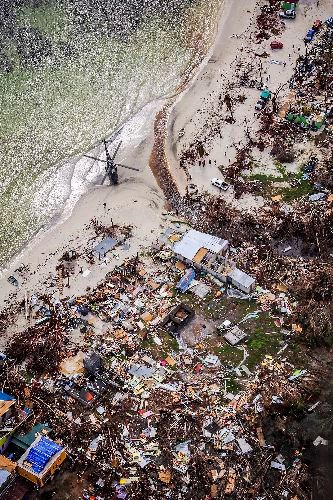When a horrific disaster strikes halfway across the world, Chiran Livera often knows that he will be boarding a plane within hours.
As the senior operations manager of international operations for the Canadian Red Cross, his job involves being one of the first humanitarian workers to arrive in regions in the midst of crises. His role is to lead the emergency phase of humanitarian operations, assess the most pressing needs and to help plan the immediate response.
"It's a bit surreal because I'm coming into a place where everyone is trying to leave," said Livera in a phone interview.
Livera will be sharing some of his experiences with students at UNBC on Friday at 12 p.m.
in room 5-175. The event is part of the university's Global Friday Speaker Series.
Climate change has had an impact on the severity of international emergencies over the last several years, according to Livera. Last year, his work took him to Peru in the wake of flooding caused by intense downpours. Over the fall, he spent time in the Caribbean islands of Barbuda, Antigua and Dominica, three islands which sustained intense damage following a volley of hurricanes. The hurricane season also wrought unprecedented damage in Puerto Rico, and along the coast of Florida and Texas. Livera believes these disasters demonstrate that the severity of weather events has been aggravated by climate change.
"With climate change, especially in the Caribbean, there's not necessarily more hurricanes, but the hurricanes that do form are significantly stronger. Last year there were three major hurricanes at the same time, which is very rare in the Caribbean," he said.
Livera, who grew up in B.C.'s Lower Mainland, began working with the Red Cross as a teenager. Since then he has responded to several emergencies including the 2004 tsunami in South Asia, the 2010 earthquake in Haiti, the 2014 Ebola crisis in West Africa and, most recently, the refugee crisis of the Rohingya people along the border of Myanmar. He has a degree in political science from Simon Fraser University and speaks French, Spanish and Sinhala.
He believes that the most important and unsung work involved in crisis response is actually building local capacity.
"We're always trying to see, how are we actually empowering the local system that's already in place - the local government, the local civil defense system or the Red Cross branches," he said.
"We know that only by making them stronger will we actually make the response better."
Chiran Livera's presentation can be livestreamed on Friday at https://video.unbc.ca/


